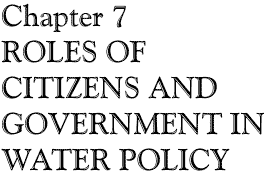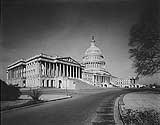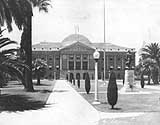
| ch. 7, pp. 85 - 86 |
Over the years citizen groups and individuals have played important roles in setting water policy. People have served on advisory committees such as the City of Tucson’s Citizen’s Water Advisory Committee, Pima County’s Wastewater Advisory Committee and the Arizona Department of Water Resources’ (ADWR) Groundwater Users’ Advisory Committee for the Tucson Active Management Area (TAMA). Many non-profit groups have worked hard to support or change policies concerning water over the years. Tucsonans for a Clean Environment worked for cleanup of the TCE problem. In the 1970s, citizen groups such as Arizonans for Water Without Waste, Citizens Against the CAP and Citizens to Revise Arizona Water Law unsuccessfully opposed CAP, and specifically its use in Tucson. These groups, however, played a role in developing alternative strategies, including support of the 1980 Groundwater Management Act. The Southern Arizona Water Resources Association, on the other hand, was initially established to ensure that Tucson got its fair share of CAP water and eventually developed a much broader purpose, including providing information to the community on a wide range of topics. The Tucson Regional Water Council is another group which supports the CAP but has a broader purpose of working to ensure a long-term water supply for the area. The importance of the “initiative process” in policy making was demonstrated in the 1995 city election when The Pure Water Coalition succeeded in reversing Tucson’s policies on CAP water use by persuading voters to approve Proposition 200 and pass the Water Consumer Protection Act (WCPA). The Citizens Alliance for Water Security is following this same tradition in promoting another initiative for the 1999 ballot, which would extend the WCPA. These groups are opposed to direct use of CAP water in the municipal water system, but promote its use for alternate purposes.. Many other citizen groups such as the League of Women Voters, the Sierra Club, the Arizona Native Plant Society and others have been involved in a variety of water issues, from hazardous waste disposal to promotion of low-water use plants in landscaping.
Over the past century, various laws and regulations at the federal, state and local levels have impacted how we manage water. In addition, interstate and even international treaties limit the amount of Colorado River water we can take. Finally, various Supreme Court decisions and legal settlements, especially those having to do with Indian water rights, affect our use of water. This chapter describes the most significant laws, regulations and court decisions that affect water decisions in the Tucson area. The annotated bibliography lists sources for more detailed information. Managing Tucson’s Water
No single entity oversees or administers all water use in the Tucson area. A combination of municipal water utilities, private water companies, irrigation districts, school districts, businesses and even individuals provide water in the area. There are 19 water companies with more than 2,000 customers and more than 130 other small water providers. (See Appendix B for a list.) Some water utilities operate within Tucson city limits, and Tucson Water operates both inside and outside city limits. All utilities provide water to customers under rules established by state and federal governments to protect the users and, in some cases, to protect future generations of users. Some laws and regulations protect people from unsafe drinking water, while others are designed to prolong the water supply. Individuals who pump their own water for domestic use are not subject to most of the rules — domestic wells that pump less than 35 gallons per minute are exempted. Those relying on such well s, however, are not protected by regulations to ensure the health and safety of water consumers. Indian tribes generally are not subject to state or federal rules, but often have their own system for managing water and protecting users.
|


